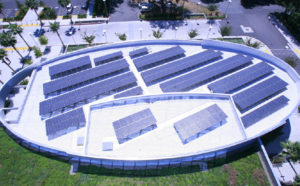By Mark MacCracken, Portfolio Leader, CALMAC® Portfolio, Trane.
For building owners and facility managers ready to start transforming their building spaces, a building with load flexibility― one that implements distributed energy resources and deploys to the most optimal resource to adapt to changing conditions― can be a significant step in zero energy progression. Further, as the number of zero energy buildings continues to grow, it’s becoming clear that those buildings with the greatest flexibility can offer multiple benefits to the grid and to the owners and managers of those buildings.
Several factors are driving an increased focus on flexibility in zero energy buildings, including:
- Connected Buildings – Highly inflexible buildings can create a lot of challenges for the grid. By deploying to the most optimal resource, zero energy buildings can adapt to changing conditions relieving stress and other unintended impacts on the grid.
- Electrification – In some areas around the world, the industry is moving to an all-electric system, where there are a number of renewable energy sources that can be utilized to achieve zero energy building with lessening dependence on fossil fuels.
- Solar cost reduction – Solar will become the cheapest source to produce power in many countries over the next 15 years with solar photovoltaic costs expected to decrease by 66 percent by 2040.[3]
- Industry pressure – Industry leaders are leading change. The 2030 Challenge, developed by Architecture 2030® and supported through by The American Institute of Architects’ 2030 Commitment, has already been adopted by 65 percent of the nation’s top 20 architectural and engineering firms. The Challenge calls for all new buildings to be carbon neutral by 2030.[4]

A global survey by Newsweek Vantage found that three-quarters of major companies – including Ingersoll Rand® and climate brands Thermo King® and Trane® – are aiming for net zero greenhouse gas emissions to help mitigate climate change and prevent catastrophic global warming by 2050 or earlier.[5] Ingersoll Rand (together with Thermo King and Trane) has set a target to reduce their product-based emissions by one gigaton of CO2e by 2030.[6]
Load Flexibility Takes Zero Energy to New Heights
Load flexibility can help better control energy usage in real time. As more renewable energy is added to the grid and to buildings, the ability for zero energy buildings to be flexible – which ideally includes the ability to manage energy use in real time – can reduce emissions by making renewable energy resources more effectively dispatchable. This load flexibility also can help reduce the amount of energy that zero energy buildings will have to draw from the grid during low solar intensity. Load flexibility can also help buildings use energy as needed throughout the day as the building load changes due to the movement of things like the sun or people. Ultimately, load flexibility can help reduce energy spend, providing lower costs at higher value.
Load flexibility may come in the form of storage-backed distributed energy resources, demand response, etc. One example is thermal energy storage systems, which behave like an air-conditioning battery to provide load flexibility. The system’s chiller charges energy storage equipment when excess or inexpensive energy is available. The energy storage can then discharge when demand and prices are high or when the utility asks for the discharge to occur.
Variable refrigerant flow (VRF) in commercial buildings or ductless systems in residential multi-family dwellings or even single-family homes can make flexible use of solar and occupant loads at different times in different parts of the building. By running these systems only as needed to meet demand, owners can adjust temperature room by room. An accurately sized system can deliver simultaneous cooling and heating year-round, providing unmatched energy efficiency and precise comfort control in modern and older buildings, commercial buildings and homes. Geothermal wells can be utilized to extract or reject heat with the earth using water-source condensers and VRF fan coil units. Heat rejected from system can be used to provide domestic hot water and reduce demand from fossil-fueled boilers.
Approaching Zero Energy
Every building, commercial or residential, has a financial or sustainable goal – or both! Either way – a more flexible, energy agile zero energy building offers a more powerful way to decarbonize and reduce energy spend, providing lower costs at higher value. As more renewable energy is added to the grid and to buildings, load flexibility offers a powerful way to decarbonize, manage energy loads and reduce energy spend.
[1] New Building Institute, “Getting to Zero: 2018 Getting to Zero Status Update and List of Zero Energy Projects,” 2018, p. 6 http://gettingtozeroforum.org/wp-content/uploads/2018/01/2018_GtZStatusUpdate_201808.pdf
[2] Slowey, Kim, “Report: Global net-zero energy building market to reach $1.4T by 2035, Jan. 6, 2017,” http://www.constructiondive.com/news/report-global-net-zero-energy-building-market-to-reach-14t-by-2035/433521/
[3] Fehrenbacher, Katie, “Solar is Going to Get Ridiculously Cheap,” Fortune Magazine, June 13, 2016, http://fortune.com/2016/06/13/solar-to-get-crazy-cheap/
[4] Architecture 2030 Challenge, http://architecture2030.org/2030_challenges/2030-challenge/
[5] Ingersoll Rand, The Race Towards Net Zero, October 1, 2019, http://company.ingersollrand.com/news/2019/the-race-towards-net-zero–.html
[6] Ingersoll Rand, our Climate Commitment, http://company.ingersollrand.com/strengths/sustainability/our-climate-commitment.html
